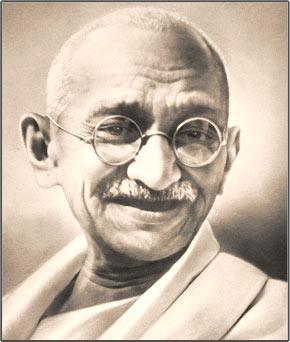 As I mentioned before, Mohandas Gandhi was deeply drawn to Jesus and his teachings. When he died in 1948, he had about a dozen books in his possession, including the Gospel of John and The Life and Teachings of Jesus Christ. But he never accepted Jesus as more than a great teacher, and he held that Paul's teachings were grafted onto those of Jesus.
As I mentioned before, Mohandas Gandhi was deeply drawn to Jesus and his teachings. When he died in 1948, he had about a dozen books in his possession, including the Gospel of John and The Life and Teachings of Jesus Christ. But he never accepted Jesus as more than a great teacher, and he held that Paul's teachings were grafted onto those of Jesus.I don't know exactly why he reached the conclusion that Paul contradicted Jesus, but I can make an educated guess. Some people claim that Jesus taught salvation by works while Paul taught salvation by faith. Gandhi never seemed to accept the idea that salvation could come by faith, probably in part because his Christian friends didn't seem to really understand it themselves. I discussed that in my previous post. If Gandhi saw Jesus as a great moral teacher who said little about faith, that might explain why he was drawn to him and felt like Paul taught something completely different.
But Jesus and Paul taught exactly the same gospel in different ways. Jesus was like a novelist and Paul a theologian. A novelist is supposed to show, not tell, and that is exactly what Jesus often did. He told stories to illustrate what the kingdom of God is like, using a lot of symbolism, and he demonstrated what faith looks like in action. His way of teaching was like drawing our attention to the beauty of a flower.
Paul's way, on the other hand, was like dissecting the flower and analyzing each part scientifically. He explained the nature of faith in a very nuanced and complex way. But his message was always ultimately about "faith working through love" (Galatians 5:6). Paul recognized that the gospel is as simple as it is profound.
Jesus and Paul both taught justification by faith, which means that we have peace with God through Jesus Christ (Romans 5:1). This is a gift, quite apart from any goodness in us. But Paul discussed the subject at great length from a theological standpoint, while Jesus simply illustrated what type of person will be justified. He told a parable to some people who "trusted in themselves that they were righteous, and viewed others with contempt" (Luke 18:9). A Pharisee and a tax collector went to the temple to pray. The Pharisee thanked God that he wasn't corrupt like other people, including the tax collector. But the tax collector couldn't even lift his eyes to heaven. "God, be merciful to me, a sinner!" Jesus declared that the tax collector went away justified, "for everyone who exalts himself will be humbled, but he who humbles himself will be exalted" (Luke 18:14). So here we have a man who was still very much a sinner, but he was set right in God's eyes.
Likewise, both of them taught that salvation must be through faith alone, but that true faith leads to good works. Paul says that we are chosen for "salvation through sanctification by the Spirit and faith in the truth" (2 Thessalonians 2:13). In other words, faith means that the Holy Spirit lives within us and transforms us from the inside out. Jesus illustrates this in John 15 by saying that he is the vine and we are the branches. If we abide in him, we will bear much fruit, but apart from him we can do nothing. His Spirit is like the sap that flows through to the branches, and the fruit is love, joy, peace, patience, kindness, goodness, faithfulness, gentleness, and self-control (Galatians 5:22-23).
It is true that Jesus spent a lot of time talking about how we are to live and setting the standard. And Gandhi appreciated that. But the standard is impossibly high because of our human limitations. Gandhi saw that, too. At the end of his life, he wrote: "It is an unbroken torture to me that I am still so far from him whom I know governs every breath of my life and whose offspring I am. I know it is because of the evil passions within me that keep me so far from him; yet I can't get away from them."
Gandhi saw very clearly that the goal is always love, but he never recognized that faith in Christ is the only means by which we can lay hold of it. The gift of salvation is to let the love of Christ flow through us, putting to death the "evil passions" that even a lifetime devoted to virtue can't control.
Jesus set the standard so high because he enables us to meet it by changing our hearts. He was far more than just a good teacher--he came that we "may have life, and have it abundantly" (John 10:10).



